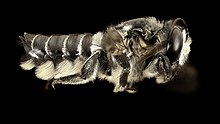| Megachile pruina | |
|---|---|
| Scientific classification | |
| Domain: | Eukaryota |
| Kingdom: | Animalia |
| Phylum: | Arthropoda |
| Class: | Insecta |
| Order: | Hymenoptera |
| Family: | Megachilidae |
| Genus: | Megachile |
| Species: | M. pruina |
| Binomial name | |
| Megachile pruina Smith, 1853 | |

Megachile pruina, also known as the Hoary Leafcutter Bee, is a species of bee in the family Megachilidae. It was described by Smith in 1853.
Taxonomy and phylogeny
Megachile pruina is a species of bee in the subfamily Megachilinae, belonging to the subgenus Pseudocentron Mitchell, 1934. Specimens of Megachile pruina from Bermuda were initially classified as the subspecies M. pruina bermudensis Mitchell, 1929, but were later reclassified as M. pruina pruina due to their color resemblance to a specimen from North Carolina. In 1937, a second subspecies, M. pruina nigropinguis Mitchell, was described to account for a dark female variant collected in Texas.
In 2024, a genetic study suggested that populations from Bermuda are genetically distinct from those in the United States. However, U.S. populations showed no significant genetic differences among themselves, suggesting that the formal subspecies classifications may be invalid.
Megachile pruina shares a monophyletic lineage with other Pseudocentron species and exhibits closer relationships with species collected from the Caribbean and Mexico compared to South American species.
Description and identification
Megachile pruina is a medium-sized (11-13mm). These bees present a sexual dichromatism, in which the females can be very dark.
Distribution
Megachile pruina is found in the United States, ranging from Virginia to Florida, and extending westward to Texas mostly along coastal habitats. The species is also considered native to the islands of Bermuda. In Bermuda, since 1989, its distribution has been confined to the Castle Harbour Islands Nature Reserve. Nonsuch Island serves as its primary habitat, with additional observations recorded on Cooper's Island, Southampton Island, Horn Rock, and Castle Island.
Conservation status
Bermuda's population of Megachile pruina is currently classified as "Vulnerable" under the Protected Species Amendment Order (2016) and is the only arthropod protected under the Bermuda Protected Species Act.
References
- ^ "Megachile". BioLib. 2014. Retrieved 18 October 2014.
- Mitchell, Theodore B. (1937). "A Revision of the Genus Megachile in the Nearctic Region. Part VI. Taxonomy of Subgenera Argyropile, Leptorachis, Pseudocentron, Acentron and Melanosarus (Hymenoptera: Megachilidae)". Transactions of the American Entomological Society. 63 (1): 45–83. ISSN 0002-8320. JSTOR 25077387.
- ^ Rose, Jennifer; Gilbert, M. Thomas P.; Outerbridge, Mark; Morales, Hernán E. (2024-08-30). "Evolutionary genomics analysis reveals a unique lineage of Megachile pruina found in an isolated population in Bermuda". Insect Conservation and Diversity. doi:10.1111/icad.12776. ISSN 1752-458X.
- Stone, Sunny; Smith, Adam; Pogorelac, Chelsea; Tooker, Megan W. (2009-08-01). Camp Upshur, Marine Corps Base Quantico, VA Architectural Survey (Report). Fort Belvoir, VA: Defense Technical Information Center. doi:10.21236/ada522285.
- Ascher, Pickering, J.S., J. (2020). "Discover Life bee species guide and world checklist".
{{cite web}}: CS1 maint: multiple names: authors list (link) - ^ "Leafcutter Bee". The Department of Environment and Natural Resources. Retrieved 2022-05-18.
| Taxon identifiers | |
|---|---|
| Megachile pruina | |
This Megachile-related article is a stub. You can help Misplaced Pages by expanding it. |